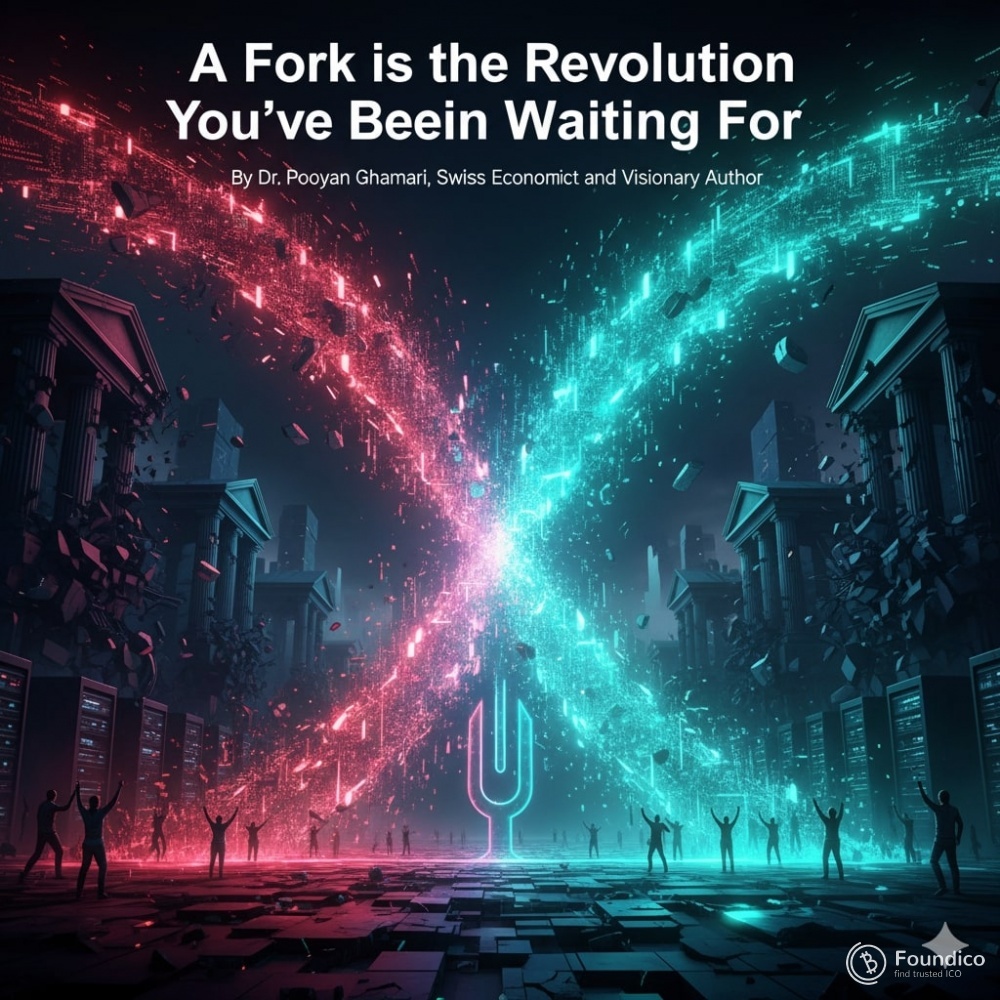A Fork is the Revolution You’ve Been Waiting For

By Dr. Pooyan Ghamari, Swiss Economist and Visionary Author
In the annals of history, revolutions are often depicted as violent uprisings, sudden overthrows of power, or dramatic shifts in societal structures. We envision barricades, protests, and seismic political changes. But what if the most profound revolution of our time is happening not in the streets, but in the digital ledger? What if the true dismantling of established hierarchies and the redistribution of power is occurring not through bloodshed, but through a lines of code and consensus mechanisms? I argue that, within the realm of blockchain, a "fork" is precisely the revolution you've been waiting for.
The Power of Exit: True Sovereignty in Code
Traditional systems—be they financial, political, or social—are notoriously resistant to change. They are designed to entrench power, making it incredibly difficult for dissenters to meaningfully alter the status quo. If you disagree with a bank's policies, your only real option is to move your money to another bank, which likely operates under similar constraints. If you disagree with a government, your options are limited to voting (often for one of two pre-approved choices), protesting, or, in extreme cases, emigration or armed conflict.
Blockchain technology fundamentally alters this dynamic through the mechanism of the hard fork. A hard fork is not merely an upgrade; it is a declaration of independence. It is the ultimate expression of the "power of exit." If a community of users, developers, and economic actors within a blockchain network fundamentally disagrees with the direction, governance, or principles of the existing chain, they have the ultimate recourse: to copy the ledger, change the rules, and establish an entirely new, independent chain.
This is where the revolutionary power lies:
-
Permissionless Dissent: No central authority can prevent a fork. If enough participants are willing, they can collectively decide to chart a new course, taking the history of the ledger (and potentially its value) with them. This is a level of permissionless dissent unheard of in traditional systems.
-
Redistribution of Power: Forks are not always about breaking away entirely; they can also be about enforcing the will of a decentralized collective. When a fork is proposed and adopted, it signifies a successful consensus shift, demonstrating that power truly resides with the network participants, not solely with core developers or large stakeholders. It’s a mechanism for the community to "vote with their code and capital."
-
Adaptive Evolution: Revolutions are often seen as destructive. Forks, however, can be constructive evolutions. They allow a system to adapt rapidly to new technological insights, changing economic realities, or shifting community values. Instead of being stuck with an outdated or ill-suited design, a network can undergo a radical, yet organized, transformation.
Beyond Politics: Economic and Social Revolution
The revolutionary potential of forks extends beyond merely technical upgrades:
-
Economic Re-calibration: Forks can redefine monetary policy, transaction fees, or inflation schedules. These are decisions that, in traditional finance, are controlled by unelected central bankers and can have profound impacts on global economies. In a decentralized system, these critical economic levers can be subject to community consensus and, if necessary, radical adjustment through a fork.
-
Social Governance: As blockchain protocols evolve into decentralized autonomous organizations (DAOs), forks become a powerful tool for self-governance. They allow communities to amend their foundational "constitutions" (the protocol rules) in response to challenges, ensuring that the system remains aligned with the collective will of its participants.
-
Resistance to Capture: The ever-present threat of a fork acts as a powerful deterrent against centralized capture or malicious actors. Any attempt by a single group to dominate or manipulate the network can be met with the community’s ability to simply "fork away" from the offending entity, rendering their power moot on the new chain.
The Ongoing Revolution
The concept of a fork embodies the true spirit of decentralization: continuous, adaptive, and driven by collective agency. It’s not a revolution of violence, but of voluntary association and technological self-determination.
For those who have felt disenfranchised by opaque financial institutions, centralized authorities, and systems resistant to meaningful change, the fork offers a powerful, undeniable pathway to liberation. It reminds us that in the digital age, power can truly reside not in institutions or individuals, but in the consensus of a network—a network that always holds the ultimate power to redefine its own reality.
The revolution isn't coming; it's already here, coded into the very fabric of decentralized networks, waiting for its next activation.

 Maxi Doge - $MAXI is the meme-powered token of Maxi Doge—a body-building, 1000x-leverage-trading Doge who represents ultimate strength, hustle, and the grind of the bull market. He never skips leg day, a 1000x trade, and he definitely never touches grass.
Maxi Doge - $MAXI is the meme-powered token of Maxi Doge—a body-building, 1000x-leverage-trading Doge who represents ultimate strength, hustle, and the grind of the bull market. He never skips leg day, a 1000x trade, and he definitely never touches grass.